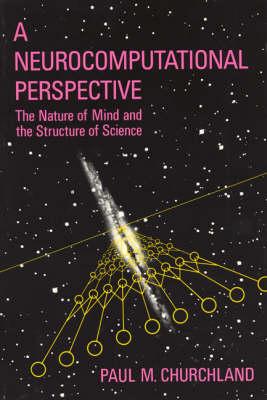Overview
Churchland argues that the central problems in the philosophy of science can only be solved by drawing heavily on the resources of the emerging sciences of the mind-brain. This text shows the fertility of the concepts drawn from the study of the brain and artificial networks that model the brain. These concepts bring unexpected coherence to scattered issues in the philosophy of science, new solutions to old philosophical problems, and new possibilities for the enterprise of science itself.
Full Product Details
Author: Paul M. Churchland (University of California, San Diego)
Publisher: MIT Press Ltd
Imprint: MIT Press
Edition: New edition
Dimensions:
Width: 15.20cm
, Height: 2.00cm
, Length: 22.90cm
Weight: 0.544kg
ISBN: 9780262531061
ISBN 10: 0262531062
Pages: 341
Publication Date: 22 April 1992
Recommended Age: From 18 years
Audience:
College/higher education
,
Professional and scholarly
,
Undergraduate
,
Postgraduate, Research & Scholarly
Format: Paperback
Publisher's Status: Unknown
Availability: Out of print, replaced by POD 
We will order this item for you from a manufatured on demand supplier.
Table of Contents
Part 1 The nature of mind: eliminative materialism and the propositional attitudes - why folk psychology is a theory, why folk psychology might (really) be false, arguments against elimination, the conservative nature of functionalism, beyond folk psychology; functionalism, qualia, and intentionality - four problems concerning qualia, the problem of nonstandard realizations, functionalism and methodology; reduction, qualia, and the direct introspection of brain states - intertheoretic reduction, theoretical change and perceptual change, Thomas Nagel's arguments, Jackson's knowledge argument; knowing qualia - a reply to Jackson - the persistent equivocation, other invalid instances, a genuinely nonequivocal knowledge argument, converting a third-person account into a first-person account; some reductive strategies in cognitive neurobiology - laminar cortex, vertical connections, and topographic maps; sensorimotor coordination, coordinate transformation - its physical implementation, cortex with more than two layers, beyond state-space sandwiches, the representatonal power of state spaces; folk psychology and the explanation of human behaviour - objections to the theoretical view, an alternative form of knowledge representation, addendum - commentary on Dennett; reductionism, connectionism, and the plasticity of human consciousness - the plasticity argument, the cultural-embedding objection. Part 2 The structure of science: the ontological status of observables - in praise of the superempirical virtues - how van Fraassen's problem collapses into Hume's problem, the primacy of the superempirical virtues, toward a more realistic realism; on the nature of theories - a neurocomputational perspective - the classical view of theories, problems and alternative approaches, elementary brainlike networks, representation and learning in brainlike networks, some functional properties of brainlike networks, how faithfully do these networks depict the brain?, computational neuroscience - the naturalization of epistemology; on the nature of explanation - a PDP approach - conceptual organization in PDP networks, recognition and understanding, prototype activation - a unified theory of explanation, inference to the best explanation, comparison with earlier models; learning and conceptual change - multiple conceptual competence, conceptual change versus conceptual redeployment, what drives conceptual change?, automated science; perceptual plasticity and theoretical neutrality - a reply to Jerry Fodor - the etiologty of perceptual belief, the semantics of observation predicates; conceptual progress and word-world relations - in search of the essence of natural kinds - natural kinds and scientific progress - the Putnam-Kripke view, natural kinds as law-bound kinds - some virtues, consequences, and difficulties; moral facts and moral knowledge - the epistemology and ontology of morals, moral prototypes and moral development, praxis, theoria, and progress.
Reviews
A bold and unified account encompassing an attitude to belief, desire, subjective experience, learning, grasp of theories and explanatory understanding.... A wide-ranging, daring and eloquently expressed vision.... I commend Paul Churchland's book as an achievement of breadth and poetry in a discipline too often breeding only stultifying narrowness. --Andy Clark, Times Higher Education Supplement
A bold and unified account encompassing an attitude to belief, desire, subjective experience, learning, grasp of theories and explanatory understanding... A wide-ranging, daring and eloquently expressed vision... I commend Paul Churchland's book as an achievement of breadth and poetry in a discipline too often breeding only stultifying narrowness. Andy Clark , Times Higher Education Supplement
"""A bold and unified account encompassing an attitude to belief, desire, subjective experience, learning, grasp of theories and explanatory understanding... A wide-ranging, daring and eloquently expressed vision... I commend Paul Churchland's book as an achievement of breadth and poetry in a discipline too often breeding only stultifying narrowness."" Andy Clark , Times Higher Education Supplement"
Author Information
Paul M. Churchland is Emeritus Professor of Philosophy at the University of California, San Diego. He is the author of The Engine of Reason, the Seat of the Soul, Matter and Consciousness: A Contemporary Introduction to the Philosophy of Mind (both published by the MIT Press), and other books.
Tab Content 6
Author Website:
Countries Available
All regions
|



